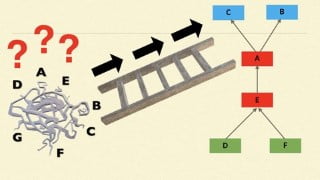Free Research Methods Tutorial – Achieving Research Impact
Learn how to achieve research impact and gain a competitive edge in grant funding. This course provides practical guidance on planning, evaluating, and articulating the impact of your research. Suitable for researchers, funders, and partners looking to maximize the potential of publicly funded research.
Learn what impact of research is and how to achieve it, by purposeful planning and evaluation that involves stakeholders at each stage.
Gain a competitive edge
There are benefits to understanding what research impact is, how to achieve and assess it.
For researchers and trainees, gain an edge over your competition for grant funding by becoming better at articulating the intended short-, medium- and long-term impact(s) of your research and associated knowledge translation and/or commercialization activities.
For funders and partners, understand the CPPI to facilitate communication with researchers about your expectations, so you can get more out of your investments in university-based research.
For researchers, funders and partners, increase your chances for making a difference with the time and resources you are putting into research!
Master Impact Planning and Assessment
Learn to apply the CPPI to your research project or program. Plan and evaluate activities, outputs and outcomes with stakeholder engagement at each stage from research to impact. Use the worksheets and examples throughout for planning and evaluation of individual research projects or programs of research. Draft indicators for each stage of the CPPI from research through dissemination, uptake, implementation and impact(s).
For funders and partners, gain skills to help you work with researchers for impact planning and reporting of the research you invest in.
For researchers, research trainees and funders, stay ahead of the global trend that favours the achievement of impact(s) from publicly funded research.
Contents and Overview
This course contains 32 lectures (1.5 hours of video content) and includes downloadable resources throughout. It’s designed for established researchers and researchers-in-training, as well as funders and other supporters of research such as industry and community partners who wish to maximize the potential of research to make a difference for society. It’s not for beginners, at a minimum you should know that knowledge translation is more than just communication of research findings (dissemination) it is also dependent upon ongoing engagement with stakeholders (integrated knowledge translation).
The course contains:
· Video lectures and slides
· Worksheets that help you apply the Co-Produced Pathway to your work
· A quiz to check your overall understanding
Many frameworks for knowledge translation that have been published, however, most are limited in their utility. The Co-Produced Pathway to Impact was borne out of a need for a practical framework; it encompasses the interrelated realms of research, knowledge translation and/or commercialization and can be used for both planning and evaluation. It has been adopted by several federally-funded organizations within Canada including the Networks of Centres of Excellence (NCE) program and individual NCEs such as Kids Brain Health Network, PREVNet and CellCAN.
Starting with a high-level overview of the Co-Produced Pathway to Impact (CPPI) framework, this course will take you through each stage of the framework from research through dissemination, uptake, implementation and impact with worksheets for planning and evaluation at each stage.
As the course progresses, you will get a closer and more detailed understanding of this multi-layered and practical framework.
In this course, you’ll learn the components of the CPPI and how to use it. You’ll learn how to plan and create indicators to evaluate your research and associated KT and commercialization project (or program) components in a way that sets you up to achieve impact using the logic model that underpins the CPPI.
You will learn the importance of ongoing stakeholder engagement throughout all stages from research to impact, and how setting up your project in response to end-user (‘target audience’ or ‘customer’) need(s) right from the start is key. You’ll also learn what stakeholder engagement can look like at each stage of the framework in terms of roles, levels of engagement (co-production being the deepest level of involvement), and types of contributions to (and benefits gained from) the project.
This course contains worksheets to help you write out your activities, outputs and outcomes, understand what they are and how they relate to each other.
You’ll also receive bonus material that reinforces the concepts you’ve learned, and gives you an additional level of detail about the topics covered in this course.
By the end of this course, you’ll have valuable skills that will help you plan your projects, centred around achieving and assessing short-, medium- and long-term impact(s). You will receive a certificate of completion upon finishing the course.
Who this course is for:
- This course about how to achieve Research Impact is for Master’s students, PhD students, Post-Doctoral Fellows, Scientific Directors, government (and other) funders of research, and research partners who are not familiar with what research impact is or how to achieve it
- This course is also for Knowledge Translation/Research Impact practitioners who assist researchers, graduate students and funders of research with KT planning and evaluation
- This course can also be useful for individuals and organizations who wish to plan their programs and activities with existing research evidence, or who wish to partner with university-based researchers for conducting new research
- This course is probably not for you if you are seeking individual support for creating a knowledge translation plan for your research project
User Reviews
Be the first to review “Free Research Methods Tutorial – Achieving Research Impact”
You must be logged in to post a review.







There are no reviews yet.